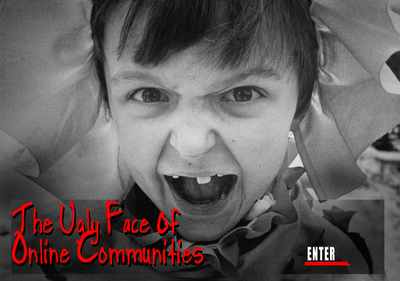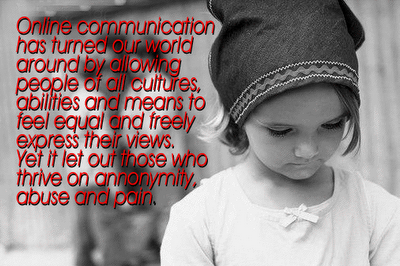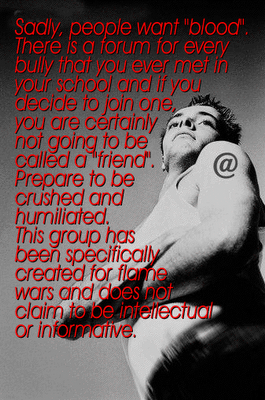The Ugly Face of the Internet Community
 We have all seen them in action. Their profiles are usually the same. Bullies, trolls and flamers--Their only intention is to destroy online communities. They thrive in the pain they inflict on others. At Freakspeaker.com we are commited to improving our online community. So here we are publishing some resources we think might be helpful.
We have all seen them in action. Their profiles are usually the same. Bullies, trolls and flamers--Their only intention is to destroy online communities. They thrive in the pain they inflict on others. At Freakspeaker.com we are commited to improving our online community. So here we are publishing some resources we think might be helpful.
Conflict in Cyberspace: How to Resolve Conflict Online by Kali Munro, M.Ed., Psychotherapist
The Paradox of Online Communication
Handling conflict constructively is hard at the best times, and it can be even harder online. It can take a great deal of effort, care, and thoughtfulness to address differences, tensions, and conflicts online. Paradoxically, some of the same things that contribute to heightened conflict online can contribute to peaceful resolutions as well. The internet is an ideal place to practice communication and conflict resolution skills. Just as the absence of visual and auditory cues, the anonymity, invisibility, delayed reactions, and neutralizing of status free us to say what ever negative thing we want, they can also free us to try new, and more positive communication styles and to take all the time we need to do that. As with any new technology, the internet can be used to enhance our personal growth and relationships, or to alienate us from each other. It’s our choice.
Tips for Resolving Conflict Online
- Don’t respond right away
- Read the post again later
- Discuss the situation with someone who knows you
- Choose whether or not you want to respond
- Assume that people mean well, unless they have a history or pattern of aggression
- Clarify what was meant
- Think about what you want to accomplish by your communication
- Verbalize what you want to accomplish
- Use “I” statements when sharing your feelings or thoughts
- Use strictly feeling statements
- Choose your words carefully and thoughtfully, particularly when you’re upset
- Place yourself in the other person’s shoes
- Use emoticons to express your tone
- Start and end your post with positive, affirming, and validating statements
 Online Forums And How Board Owners Can Avoid Verbal Abuse by Milana Nastetskaya
Online Forums And How Board Owners Can Avoid Verbal Abuse by Milana Nastetskaya"The Internet is an ideal environment for the bully and the self-righteous - you can attack personally without being personally in front of the victim. The flame is an unavoidable result of one-to-one communication that isn't face-to-face..."
Why do people attack on forums? Many times it is because they have a strong opinion about a subject, and want it to be heard. But it only takes one such post to have others jump in and turn an innocent question into an ugly war that is very difficult to stop.
Sadly, people want "blood". Someone even created a discussion group called alt.flame. It is a forum for every bully that you ever met in your school and if you decide to join, you are certainly not going to be called a "friend". Prepare to be crushed and humiliated. This group has been specifically created for flame wars and does not claim to be intellectual or informative. Many people will find a forum boring if everyone agrees. Controversial forums are much more fun and attractive to inquisitive minds of the online users.
- You may report an attack to the ISP (Internet Service Provider) of the attacker which you can identify by their e-mail address.
- One way to minimize the number of such attacks is to ask users to register.
- If forum owners are too busy to keep an eye on their forums, a good moderator is a solution.
- Do you know if you are a "forum bully?" There is a good chance that you don't realize that your posts might make others feel angry and upset. The fact is, you don't really feel that a message sounds harsh until it is directed toward you. So before you press "Send", read what you wrote. Use a lot of smiley faces (:-). Be careful how you phrase things and capitalize your words. Try to sound helpful rather than critisizing. State facts rather than emotions.
- It is hard to draw the line between an attack and a strongly opinionated message. Who should decide? Moderators. The fairness of moderators, though, is totally subjective.
- Some users expressed their willingness to pay an annual fee to be a member of a well-moderated board.
- Another way to control a forum is to have strict banning rules.
If you are interested in more information about this topic, you might visit our website www.freakspeaker.com for the complete articles.






0 comentarios:
Post a Comment